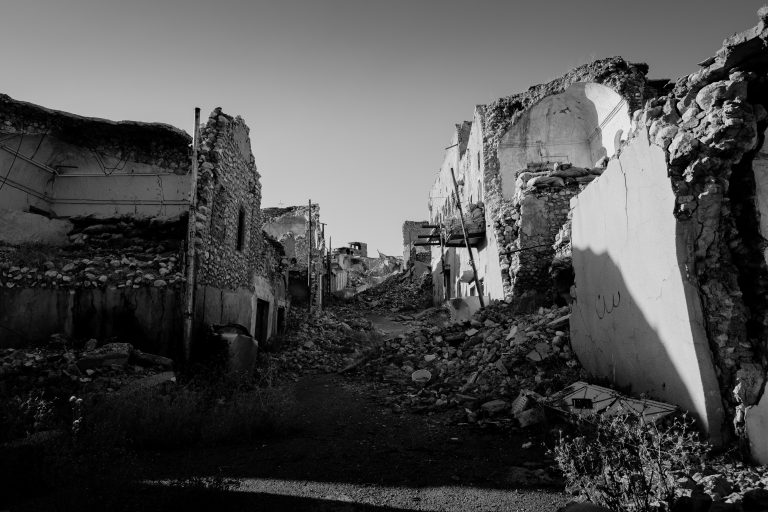

In the 7 articles in my blog, ‘Sumood’, I discuss different healthcare topics relevant in the Arab region, from mental health to gender-based violence to medical negligence and healthcare accessibility. The articles have an overarching theme of healthcare equity and policy. While the topics vary in their health focus and affected population, there remain common factors that determine populations’ health outcomes in fragile, conflict settings. This piece will cover the main common determinants of health in such settings, based on the previously covered topics in ‘Sumood’.
War attacks in conflict settings cause direct health consequences to people through injury and casualties. Longer-term direct effects include the severe detrimental impact on mental health. These articles on Gaza and Syria discuss the mental health effects of war attacks on children and health workers, respectively. These include (but are not limited to) severe stress, trauma, fear, and grief.
Indirect effects of war attacks on health include the physical and operational destruction of healthcare systems. Both Gaza and Syria have witnessed destruction of clinics and hospitals by war attacks over the years. This leaves the remaining health facilities overburdened and incapable of covering increasing medical needs. This in turn influences the physical and mental health of both health workers and patients in these contexts.
Poverty is a key determinant/barrier of health worldwide, and its effects are more severe in fragile settings like conflict areas. These articles showed that Palestinian refugees in Jordan, refugee Persons with Disabilities (PwDs) in Lebanon, and Bedouin communities in Palestine all suffer from dire financial conditions. High poverty rates prevent these populations from obtaining healthy lifestyles – which are often expensive to afford – and from accessing paid health services (which correlates with inequity in access, described below). In these contexts, legal and political barriers are one of the main barriers preventing vulnerable populations from accessing the labour market easily, if permitted in the first place, thus increasing rates of unemployment and poverty.
Poor living conditions could be a result of poverty and/or political restrictions. As mentioned previously, refugee populations in Jordan and Lebanon suffer from high poverty rates, and live in overcrowded camps or urban areas as a result. This, in addition to poor hygiene systems in place, make them more prone to contracting infections and diseases.
Bedouins in Palestine also suffer from poor living conditions due to high poverty rates. However, another determining factor in their poor living conditions is the deliberate mistreatment and neglect by the Israeli government. Plans to forcibly displace these communities include cutting water and electricity from the areas where they live, and banning any infrastructure for houses, medical facilities, education or agriculture. All this affects their ability to maintain healthy lifestyles or access nearby healthcare services.
Often, in conflict settings, there is poor allocation of services that are not need-based. This may be due to a lack of financial means and medical expertise, or a lack of alignment between donor interests and the actual needs. Examples from ‘Sumood’ include the lack of both specialised psychosocial support services in Gaza and specialised psychiatric service in Syria, despite being urgently required.
Inequity in accessing healthcare systems is a structural and legal issue that many populations in conflict settings face, especially in areas with high migration rates. This inequity can be on national or global levels. In Lebanon, migrant and refugee populations access different healthcare services differently, depending on where they come from. For example, Palestinians, Syrians and Lebanese residents in Lebanon access different services and have different support schemes in place, with poverty playing a determining role. PwDs in Lebanon also face inequity in accessing healthcare services due to lack of information on available services, limited physical accessibility means, and lack of trained medical staff.
On the other hand, Jordan’s health care system is more equitable than the Lebanese one when it comes to refugee populations’ access to healthcare. However, global vaccine inequity is affecting low and middle-income countries’ abilities to secure enough COVID-19 vaccinations, including Jordan. This inequity discriminates against poorer countries and certainly among poorer populations.
Legal protection mechanisms are key determinants of health that are often overlooked. Refugee PwDs in Lebanon are faced with discrimination, violence, and ill-treatment, including when accessing healthcare services. Palestinian political prisoners lack any protection from the maltreatment, torture, and deliberate medical negligence that they face in Israeli prisons. Finally, people facing gender-based violence in Palestine are confronted by societal and political violence, with little protection available.
The seven presented topics show us how politics play a crucial role in determining health outcomes. Even within social determinants, such as poverty and living conditions, political efforts are key influencers that shape these determinants. Therefore, when we think of solutions to health equity issues, we must look at the broader picture and work on solving key determinants in each setting, across political, economic, legal, and social levels.
It is challenging to solve public health issues if conflicts persist. Unjust systems must be challenged; affected populations must be heard and their needs and rights must be met; and effective collaboration for equitable universal health coverage must be prioritised, across national boundaries.
More from Rasha Kaloti here.
HPHR.org was designed by ComputerAlly.com.
Visit HPHR’s publisher, the Boston Congress of Public Health (BCPH).
Email communications@bcph.org for more information.

Click below to make a tax-deductible donation supporting the educational initiatives of the Boston Congress of Public Health, publisher of HPHR Journal.![]()